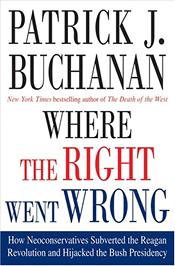Victory has a thousand fathers, but defeat is an orphan, said a rueful John F. Kennedy after the Bay of Pigs. George W. Bush knows today whereof his predecessor spoke.
For as he prepares to “surge” 20,000 more U.S. troops into a war even he concedes we “are not winning,” his erstwhile acolytes have begun to abandon him to salvage their own tattered reputations.
Case in point, the neoconservatives. As the Iraq war heads into its fifth year, more than half a dozen have confessed to Vanity Fair’s David Rose their abject despair over how the Bushites mismanaged the war that they, the “Vulcans,” so brilliantly conceived.
Surveying what appears an impending disaster for Iraq and U.S. foreign policy, the neocons have advanced a new theme. The idea of launching an unprovoked war of liberation, for which they had beaten the drums for half a decade before 9-11, remains a lovely concept. It was Bushite incompetence that fouled it up.
“The policy can be absolutely right, and noble, beneficial, but if you can’t execute it, it’s useless, just useless,” wails Ken Adelman, who had famously predicted in The Washington Post that “liberating Iraq would be a cakewalk.”
Bush’s team of Powell, Cheney, Rumsfeld and Rice, says Adelman, “turned out to be among the most incompetent teams in the postwar era. Not only did each of them, individually, have enormous flaws, but together they were deadly, dysfunctional.” Their incompetence, he adds, “means that most everything we ever stood for … lies in ruins.”
Professor Eliot Cohen of Johns Hopkins, whose book on war leaders Bush used to carry about, says his mistake was in not knowing “how incredibly incompetent” the Bush team would be.
Richard Perle is sickened by the consequences of the war he and his comrades so ardently championed. “The levels of brutality … are truly horrifying, and, I have to say, I underestimated the depravity.”
Calling the Bush policy process a “disaster,” Perle blames Bush himself: “At the end of the day, you have to hold the president responsible. … I don’t think he realizes the extent of the opposition within his own administration, and the disloyalty.”
This is the second fallback position of the War Party. Not only incompetence, but treachery made a nightmare of their vision.
ber-hawk Frank Gaffney also hits hard the theme of sabotage and disloyalty: “This president has tolerated, and the people around him have tolerated, active, ongoing, palpable insubordination and skullduggery that translates into subversion of his policies. … He doesn’t in fact seem to be a man of principle who’s steadfastly pursuing what he thinks is the right course.”
David Frum, the cashiered White House speechwriter who co-authored the “axis-of-evil” phrase, faults the president. While he provided the words, says Frum, Bush “just did not absorb the ideas. And that is the root of maybe everything.”
Where Frum, four years ago, accused antiwar conservatives of being “unpatriotic” haters of America and President Bush, he is now saying that that same president either lacked the I.Q. to realize what he was saying or lacked a belief and commitment to follow through.
As Rose writes, this is “the most damning assessment of all.” Moreover, it is an indictment of Bush’s judgment that he could clasp so many such vipers to his bosom.
Rose describes James Woolsey, the ex-CIA director who was ubiquitous on the op-ed pages and national TV making the case for war, as “aghast at what he sees as profound American errors that have ignored the lessons learned so painfully, 40 years ago” in Vietnam.
Conspicuous by its absence from disparagements of the president by these deserters from his camp and cause is any sense that they were themselves wrong. That they, who accuse everyone else of cutting and running, are themselves cutting and running. That they are themselves but a typical cluster of think-tank incompetents.
No neocon concedes that the very idea itself of launching an unprovoked war against a country in the heart of the Arab world — one that had not attacked us, did not threaten us and did not want war with us — might not be wildly welcomed by the “liberated.” No neocon has yet conceded that Bismarck may have been right when he warned, “Preventive war is like committing suicide out of fear of death.”
 “Huge mistakes were made,” says Perle, “and I want to be very clear on this: They were not made by neoconservatives. … I’m getting damn tired of being described as an architect of the war.”
“Huge mistakes were made,” says Perle, “and I want to be very clear on this: They were not made by neoconservatives. … I’m getting damn tired of being described as an architect of the war.”
Almost all the neoconservatives have now departed the seats of power in the Bush administration and retreated to their sinecures at Washington think tanks, to plot the next war — on Iran.
 Meanwhile, brave young Americans, the true idealists and the casualties of the neocons’ war, come home in caskets, 20 a week, to Dover and, at Walter Reed, learn to walk again on steel legs.
Meanwhile, brave young Americans, the true idealists and the casualties of the neocons’ war, come home in caskets, 20 a week, to Dover and, at Walter Reed, learn to walk again on steel legs.
Patrick J. Buchanan [send him mail] is co-founder and editor of The American Conservative. He is also the author of seven books, including Where the Right Went Wrong, and A Republic Not An Empire.



